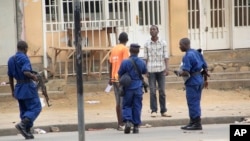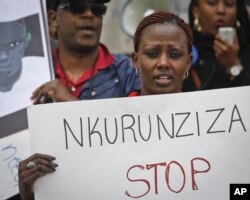On August 20, 2015, President Pierre Nkurunziza was sworn in for a hotly disputed third five-year term in office. The swearing-in followed an election that most of his opponents boycotted. He won with 69 percent of the vote.
In his oath of office, the Burundian president swore loyalty to the constitution, to assure national unity and to bring stability to the deteriorating security situation.
One year later, the sounds of gunfire might have gone silent, but political tensions and human rights abuses persist.
According to human rights organizations, more than 450 people have been killed since April 2015 and a quarter-of-a-million have fled the country seeking refuge in neighboring countries.
Dieudonne Bashirahishize, a member of the Burundi Bar Association and vice president of the East African Law Society, says the abuse against civilians and killings continues.
“People are still harassed,” he says. “Some are still in detention without following the due process and the rule of law .... There are those who got disappeared, and their families don’t know their whereabouts. Many more people are tortured in prison."
‘We want the abuses to end’
Last month, a coalition of Burundian non-governmental organizations submitted a report to the United Nations Committee Against Torture, describing the human rights situation.
The group documented torture, ill-treatment during arrests, extra-judicial killings and forced disappearances.
Four Burundi lawyers face disbarment for testifying.
Bashirahishize is one of them. He says the government should respect the laws and prosecute those behind the killings and torture that is taking place in the country.
“[The government] thought this was one of the ways to silence [us] so that we do not report the violence and abuses committed against our people," Bashirahishize said. "We want the abuses to end and those behind the crimes to be prosecuted. The government should also respect and abide by the constitution and the international law.”
The government has repeatedly denied targeting civilians and opposition areas, and insists it is defending the country against armed people.
The International Crisis Group said in a recent commentary that hardliners have taken over Nkurunziza's government.
The Brussels-based research organization said the spoilers are determined to do away with the institutional system established by the Arusha accord, which ended the country’s civil war and created an ethnic power-sharing agreement between the Hutu majority and Tutsi minority.
Vital Nshirimana, head of Burundi’s Forum for Strengthening the Civil Society, says President Nkurunziza is destabilizing the army.
“He has disrupted the ethnic balance within the army, and those Hutu extremists are the ones who are appointed to any important position, whereas Tutsis are arrested on a daily basis," Nshirimana said. "We are very scared that the army one day will be divided, and people will no longer have protection.”





